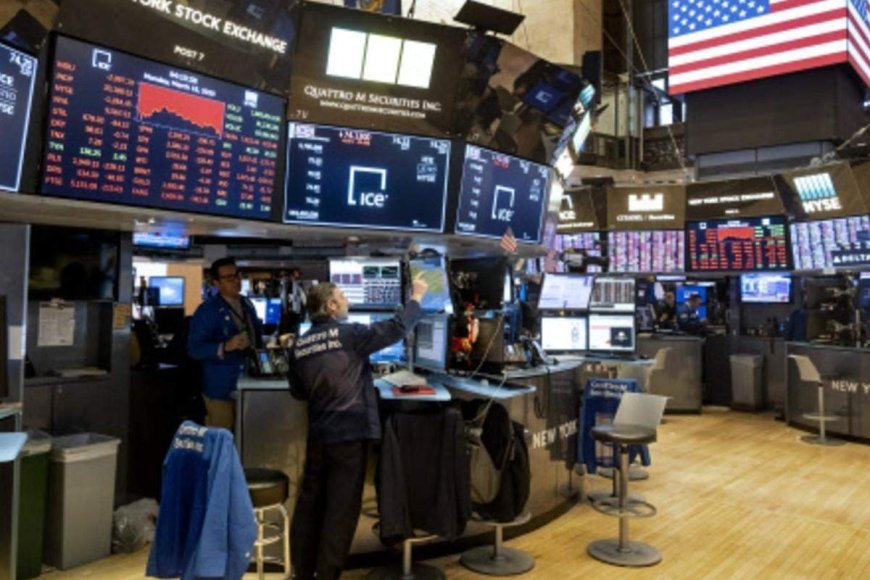US Stocks Move Up as Inflation Cools, Aiming for New Record Highs
US stocks made small gains after the Federal Reserve's favorite measure of inflation showed a slowdown in pricing increases for November. The Dow Jones Industrial Average (^DJI) stayed nearly unchanged, the S&P 500 (^GSPC) inched up about 0.3%, and the Nasdaq Composite (^IXIC) rose close to 0.4%. Despite a recent pause in the upward trend, Wall Street could still see an eighth week of gains. The S&P 500 is eyeing a potential record high, as investors believe the Federal Reserve will begin reducing borrowing costs. The latest data on the Personal Consumption Expenditures (PCE) index revealed a 3.2% rise in prices, excluding food and energy, for November compared to the previous year. This was a slight decrease from October's revised annual gain of 3.4%. Analysts had predicted a 3.3% annual increase. In individual stock moves, Nike (NKE) saw a more than 11% decline in morning trading. The company warned of job cuts and expected lower sales due to weakened consumer spending. Other sportswear makers also saw declines following Nike's reduced revenue forecast. Tencent shares (0700.HK) (TCEHY) led an $80 billion sell-off in some of China's major online names. Concerns about another tech crackdown arose after Beijing unexpectedly imposed new rules on gaming. Opening higher on the Friday before Christmas, US stocks absorbed the news of the Federal Reserve's preferred inflation reading, which indicated further cooling in pricing pressures for November. The Dow Jones Industrial Average (^DJI) saw a 0.1% or 40-point increase, while the S&P 500 (^GSPC) gained around 0.3%, mirroring the early gains of the tech-heavy Nasdaq Composite (^IXIC). In November, the fresh reading of the Federal Reserve's preferred inflation gauge, the core PCE, showed a slowing trend. The index rose by 3.2% over the year, down from October's revised annual gain of 3.4%, slightly below the 3.3% gain expected by analysts. On a monthly basis, core PCE, excluding the volatile categories of food and energy, increased by 0.1%, remaining unchanged from October's revised monthly gain. Investors closely monitored the release for signals on the central bank's potential actions regarding interest rates in the coming year. Earlier this month, the Fed indicated its intention to implement three interest rate cuts in the next year. After Wednesday's unexpected sell-off, which marked the market's worst performance in months, stocks rebounded on Thursday, with the S&P 500 and Nasdaq Composite each gaining over 1%. As a result, stocks are on track for their eighth consecutive winning week during the final full week of trading in the year. However, the most significant economic news of the week, the release of the Personal Consumption Expenditures Price Index at 8:30 a.m. ET, remains a potential factor that could influence market dynamics. This report includes the Fed's preferred inflation measure, core PCE, and is expected to show a 3.3% year-over-year increase in prices for November and a 0.2% increase over the previous month. Also Read: Stock Market Takes a Break: Wall Street Calms Down as FedEx Faces Problems

US stocks made small gains after the Federal Reserve's favorite measure of inflation showed a slowdown in pricing increases for November.
The Dow Jones Industrial Average (^DJI) stayed nearly unchanged, the S&P 500 (^GSPC) inched up about 0.3%, and the Nasdaq Composite (^IXIC) rose close to 0.4%.
Despite a recent pause in the upward trend, Wall Street could still see an eighth week of gains. The S&P 500 is eyeing a potential record high, as investors believe the Federal Reserve will begin reducing borrowing costs.
The latest data on the Personal Consumption Expenditures (PCE) index revealed a 3.2% rise in prices, excluding food and energy, for November compared to the previous year. This was a slight decrease from October's revised annual gain of 3.4%. Analysts had predicted a 3.3% annual increase.
In individual stock moves, Nike (NKE) saw a more than 11% decline in morning trading. The company warned of job cuts and expected lower sales due to weakened consumer spending. Other sportswear makers also saw declines following Nike's reduced revenue forecast.
Tencent shares (0700.HK) (TCEHY) led an $80 billion sell-off in some of China's major online names. Concerns about another tech crackdown arose after Beijing unexpectedly imposed new rules on gaming.
Opening higher on the Friday before Christmas, US stocks absorbed the news of the Federal Reserve's preferred inflation reading, which indicated further cooling in pricing pressures for November.
The Dow Jones Industrial Average (^DJI) saw a 0.1% or 40-point increase, while the S&P 500 (^GSPC) gained around 0.3%, mirroring the early gains of the tech-heavy Nasdaq Composite (^IXIC).
In November, the fresh reading of the Federal Reserve's preferred inflation gauge, the core PCE, showed a slowing trend. The index rose by 3.2% over the year, down from October's revised annual gain of 3.4%, slightly below the 3.3% gain expected by analysts.
On a monthly basis, core PCE, excluding the volatile categories of food and energy, increased by 0.1%, remaining unchanged from October's revised monthly gain.
Investors closely monitored the release for signals on the central bank's potential actions regarding interest rates in the coming year. Earlier this month, the Fed indicated its intention to implement three interest rate cuts in the next year.
After Wednesday's unexpected sell-off, which marked the market's worst performance in months, stocks rebounded on Thursday, with the S&P 500 and Nasdaq Composite each gaining over 1%. As a result, stocks are on track for their eighth consecutive winning week during the final full week of trading in the year.
However, the most significant economic news of the week, the release of the Personal Consumption Expenditures Price Index at 8:30 a.m. ET, remains a potential factor that could influence market dynamics. This report includes the Fed's preferred inflation measure, core PCE, and is expected to show a 3.3% year-over-year increase in prices for November and a 0.2% increase over the previous month.
Also Read: Stock Market Takes a Break: Wall Street Calms Down as FedEx Faces Problems




















